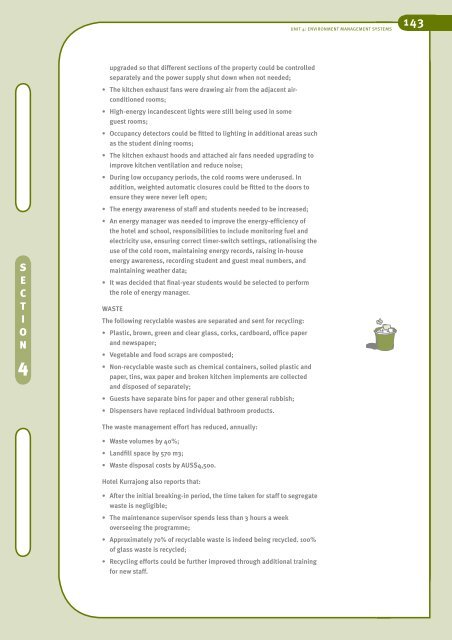Online version: PDF - DTIE
Online version: PDF - DTIE
Online version: PDF - DTIE
Create successful ePaper yourself
Turn your PDF publications into a flip-book with our unique Google optimized e-Paper software.
UNIT 4: ENVIRONMENT MANAGEMENT SYSTEMS<br />
143<br />
S<br />
E<br />
C<br />
T<br />
I<br />
O<br />
N<br />
4<br />
upgraded so that different sections of the property could be controlled<br />
separately and the power supply shut down when not needed;<br />
• The kitchen exhaust fans were drawing air from the adjacent airconditioned<br />
rooms;<br />
• High-energy incandescent lights were still being used in some<br />
guest rooms;<br />
• Occupancy detectors could be fitted to lighting in additional areas such<br />
as the student dining rooms;<br />
• The kitchen exhaust hoods and attached air fans needed upgrading to<br />
improve kitchen ventilation and reduce noise;<br />
• During low occupancy periods, the cold rooms were underused. In<br />
addition, weighted automatic closures could be fitted to the doors to<br />
ensure they were never left open;<br />
• The energy awareness of staff and students needed to be increased;<br />
• An energy manager was needed to improve the energy-efficiency of<br />
the hotel and school, responsibilities to include monitoring fuel and<br />
electricity use, ensuring correct timer-switch settings, rationalising the<br />
use of the cold room, maintaining energy records, raising in-house<br />
energy awareness, recording student and guest meal numbers, and<br />
maintaining weather data;<br />
• It was decided that final-year students would be selected to perform<br />
the role of energy manager.<br />
WASTE<br />
The following recyclable wastes are separated and sent for recycling:<br />
• Plastic, brown, green and clear glass, corks, cardboard, office paper<br />
and newspaper;<br />
• Vegetable and food scraps are composted;<br />
• Non-recyclable waste such as chemical containers, soiled plastic and<br />
paper, tins, wax paper and broken kitchen implements are collected<br />
and disposed of separately;<br />
• Guests have separate bins for paper and other general rubbish;<br />
• Dispensers have replaced individual bathroom products.<br />
The waste management effort has reduced, annually:<br />
• Waste volumes by 40%;<br />
• Landfill space by 570 m3;<br />
• Waste disposal costs by AUS$4,500.<br />
Hotel Kurrajong also reports that:<br />
• After the initial breaking-in period, the time taken for staff to segregate<br />
waste is negligible;<br />
• The maintenance supervisor spends less than 3 hours a week<br />
overseeing the programme;<br />
• Approximately 70% of recyclable waste is indeed being recycled. 100%<br />
of glass waste is recycled;<br />
• Recycling efforts could be further improved through additional training<br />
for new staff.
















